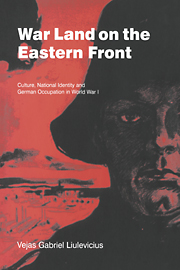Book contents
- Frontmatter
- Contents
- List of maps
- Acknowledgments
- List of abbreviations
- Introduction
- 1 Coming to war land
- 2 The military utopia
- 3 The movement policy
- 4 The Kultur program
- 5 The mindscape of the East
- 6 Crisis
- 7 Freikorps madness
- 8 The triumph of Raum
- Conclusion
- Select bibliography
- Index
- Studies in the Social and Cultural History of Modern Warfare
Conclusion
Published online by Cambridge University Press: 19 July 2009
- Frontmatter
- Contents
- List of maps
- Acknowledgments
- List of abbreviations
- Introduction
- 1 Coming to war land
- 2 The military utopia
- 3 The movement policy
- 4 The Kultur program
- 5 The mindscape of the East
- 6 Crisis
- 7 Freikorps madness
- 8 The triumph of Raum
- Conclusion
- Select bibliography
- Index
- Studies in the Social and Cultural History of Modern Warfare
Summary
Under the impact of modern war from 1914 to 1918, German views of the East underwent a fundamental transformation with far-reaching cultural and political consequences. Millions of German soldiers were directly involved in the eastern front-experience, marked by fighting significantly unlike that of the West and colored by the realities and impressions of occupation. A different face of “total war” was exposed in the East. While in the trenches of the West, soldiers cowered under relentless bombardments of industrial modernity and faced battle against machines, German soldiers in the East instead directly confronted hostile nature, an insistent past all around them in a theatre of war that seemed ever less modern, and cultural clashes with surrounding native groups. Soldiers on the Eastern Front were changed by this distinctive combat and the day-to-day practice of executing the duties of occupation and the military utopia's orders, while bombarded by Ober Ost's motivational propaganda about their cultural mission. One officer summed up his experience of the Eastern Front in a catalog of hateful features, spitting out disturbing images that he recalled. It was, he said, “Deepest Russia, without a glimmer of Central European Kultur, Asia, steppe, swamps, claustrophobic underworld, and a godforsaken wasteland of slime.” Paradoxically, such sweeping antipathy could combine with ambitions for colonization, determined to overcome the Unkultur of conquered lands and peoples.
- Type
- Chapter
- Information
- War Land on the Eastern FrontCulture, National Identity, and German Occupation in World War I, pp. 278 - 281Publisher: Cambridge University PressPrint publication year: 2000

